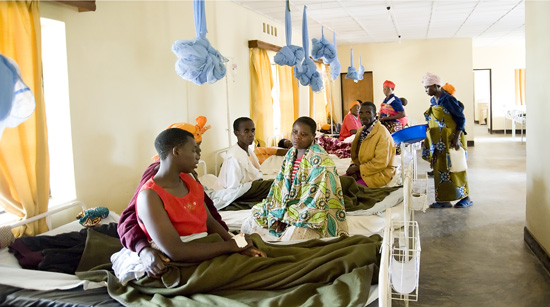
Rationing ventilators at the end of life
A doctor from Rwanda offers a unique perspective on allocation dilemmas.
What do we do when we don’t have enough life support machines for critically ill patients? A doctor from Rwanda offers a unique perspective in the latest edition of The Hastings Center Report.
Noah Polzin-Rosenberg, a former Harvard academic who now runs a training program for emergency doctors in Rwanda, describes the agonising decisions that need to be made in his severely underfunded ICU ward, where only two ventilators are available for critically-ill patients. Unlike in Western countries, health care systems such as that in Rwanda cannot afford to offer wide access to critical care for patients.
Polzin-Rosenberg describes one case in which two patients were already using the ventilators, while another patient, a young woman suffering from severe internal bleeding, had just arrived in need of artificial ventilation. Dr Polzin-Rosenberg and his team needed to make the heartbreaking choice between withdrawing artificial ventilation from a patient with a poorer prognosis to support the young woman (who could likely survive given adequate treatment) or alternatively leaving the other two patients on the ventilators and letting the woman die. He writes:
In Rwanda most cases like this end badly. You latch onto a lost cause, spend your social capital pushing everyone to double their efforts, order all the right tests and treatments. But some key part of the system fails and the patient dies anyway. The family has spent the children’s school fees on your orders. You’ve just demonstrated what everyone but you already knew: poor people die from treatable diseases all the time, despite all the good intentions you bring.
In this case, the team chose to keep the two patients on ventilators, while providing manual ventilation to the third. Miraculously, the young woman’s internal bleeding stopped, her breathing became regular again, and she recovered consciousness in a matter of hours.
Polzin-Rosenberg observes that this lucky outcome does not take away the need for a culturally-sensitive ethical framework to deal with difficult allocation decisions:
The temptation is to focus on the thing—the ventilator itself—as the crucial element and press to buy more, mistaking the problem for one of resource scarcity only. But we need a culturally relevant ethical framework to guide the use and withdrawal of ventilators and similar life-sustaining tools…The intangible need for an ethical framework hides beneath apparent scarcity and, when this need is not addressed and luck runs out, one salvageable patient can die for want of a ventilator that serves only to prolong the suffering of another.
Rationing ventilators at the end of life
Xavier Symons
Creative commons
https://www.bioedge.org/images/2008images/Rwanda_hospital.jpg
allocation of resources
justice
rwanda
withdrawal of life support
